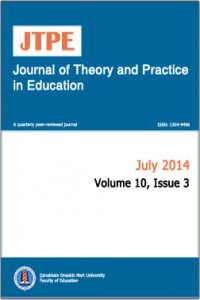Raising Awareness of Educational Philosophy: Learning and Education in Posthumanistic Philosophy / Eğitim Felsefesi ile İlgili Bir Farkindalik Çalişmasi: İnsancıl Ötesi Felsefede Öğrenme ve Eğitim
Öz
The purpose of the present study is to provide educators with a simple, brief, and easy-to-read text on western philosophy while specifically raising awareness about philosophies of education. Basic terminology such as ontology, epistemology, and paradigm are defined, and their relationships with educational philosophy as well as the role of the teachers and students are explained. Following an explanation and discussion of the major existing philosophies that have affected education throughout history, the present article provides modified definitions of learning and education and suggests a new way of thinking that is closely related to postmodernism, namely posthumanistic philosophy. These new definitions are presumed to guide and influence not only the theoretical works in education but also the practical applications.
Anahtar Kelimeler
Philosophy education learning teacher training postmodernism posthumanistic philosophy.
Kaynakça
- Allison, P. (2000). Research from the ground up post expedition adjustment. Cumbria, UK: Brathay Hall.
- Allison, P. and Pomeroy, E. (2000). How Shall We “Know?”: Epistemological Concerns in Research in Experiential Education. The Journal of Experiential Education, 23(2), 91-98.
- Best, J. W. and Kahn, J. V. (2006). Research in Education. USA: Pearson Education Inc.
- Britannica Online Encyclopaedia. http://www.britannica.com/ Cooper, J. M. and Hutchinson, D. S. (1997). Plato: Complete Works. Indianapolis, Cambridge: Hackett Publishing Company.
- Freire, P. (1970). The banking concept of education. Educational foundations: An anthology of critical readings, 99-111.
- Gutek, G. L. (2006). Egitime Felsefi ve Ideolojik Yaklasimlar. Kizilay, Ankara: Ütopya Yayinlari.
- Hicks, S. R. C. (2004). Explaining Postmodernism: Skeptisicm and Socialism from Rousseau to Foucault. USA: Scholargy Publishing.
- Kant, I. (1784). An Answer to the Question: What is Enlightenment? Königsberg in Prussia, 30 September.
- Lock, J. (1689/1975). An essay concerning human understanding.
- MacLure, M. (2007). A Demented Form of the Familiar: Postmodernism and Educational Research. In D. Bridges and R. Smith (Eds.), Philosophy, Methodology and Educational Research (pp. 43-60), Cornwall, UK: Blackwell Publishing.
- Noddings, N. (1995). Philosophy of education. Dimensions of philosophy series. Boulder, Colo.: Westview Pres.
- Phillips, D. C. (2003). Theories of Teaching and Learning. A Companion to the Philosophy of Education, 232-245.
- Powell, J. N. (1998). Postmodernism for Beginners. New York, USA: Writers and Readers Publishing.
- Pring, R. (2000). Philosophy of Educational Research. London: Continuum.
- Ratnesar, N. and Macenzie, J. (2007). The Quantitative-Qualitative Distinction and the Null Hypothesis Significance Testing Procedure. In D. Bridges and R. Smith (eds.). Philosophy, Methodology and Educational Research (pp. 107115), Cornwall, UK: Blackwell Publishing.
- Uzun, L. (2014). Acquiring, Practicing, and Retaining Knowledge through Learning and Teaching Processes: An Experiment of Moodle Based Academic Vocabulary Acquisition. (Unpublished Doctoral Dissertation). Canakkale Onsekiz Mart University, Institute of Educational Sciences, Department of Foreign Languages Education, English Language Teaching. Zack, N. (2010). The Handy Philosophy Answer Book. Detroit: Visible Ink Press.
Öz
Bu çalışmanın amacı, batı felsefesi ile ilgili basit, özet niteliğinde ve okuması kolay bir metin sunarken, özellikle eğitim felsefesi ile ilgili eğitimcilerde farkındalık yaratmaktır. Ontoloji, epistemoloji ve paradigma gibi temel kavramlar tanımlanıp açıklanarak bunların eğitim felsefesi ile ve aynı zamanda öğretmen ve öğrencilerle bağlantıları ortaya konulmaktadır. Tarih boyunca eğitimi etkilemiş başlıca felsefeler hakkındaki açıklama ve tartışmayı müteakiben, bu çalışmada postmodernizmle yakından bağlantılı ‘insancılötesi felsefe’ olarak tanımlanan yeni bir düşünme şeklini cesaretlendiren ve bu bakış açısından kaynaklı öğrenme ve eğitim ile ilgili yeniden yapılandırılmış tanımlar öne sürülmektedir. Bu yeni tanımlamaların eğitimdeki kuramsal ve pratik çalışma ve uygulamaları yönlendirip etkileyeceği öngörülmektedir.
Anahtar Kelimeler
Felsefe eğitim öğrenme öğretmen eğitimi postmodernizm insancılötesi felsefe.
Kaynakça
- Allison, P. (2000). Research from the ground up post expedition adjustment. Cumbria, UK: Brathay Hall.
- Allison, P. and Pomeroy, E. (2000). How Shall We “Know?”: Epistemological Concerns in Research in Experiential Education. The Journal of Experiential Education, 23(2), 91-98.
- Best, J. W. and Kahn, J. V. (2006). Research in Education. USA: Pearson Education Inc.
- Britannica Online Encyclopaedia. http://www.britannica.com/ Cooper, J. M. and Hutchinson, D. S. (1997). Plato: Complete Works. Indianapolis, Cambridge: Hackett Publishing Company.
- Freire, P. (1970). The banking concept of education. Educational foundations: An anthology of critical readings, 99-111.
- Gutek, G. L. (2006). Egitime Felsefi ve Ideolojik Yaklasimlar. Kizilay, Ankara: Ütopya Yayinlari.
- Hicks, S. R. C. (2004). Explaining Postmodernism: Skeptisicm and Socialism from Rousseau to Foucault. USA: Scholargy Publishing.
- Kant, I. (1784). An Answer to the Question: What is Enlightenment? Königsberg in Prussia, 30 September.
- Lock, J. (1689/1975). An essay concerning human understanding.
- MacLure, M. (2007). A Demented Form of the Familiar: Postmodernism and Educational Research. In D. Bridges and R. Smith (Eds.), Philosophy, Methodology and Educational Research (pp. 43-60), Cornwall, UK: Blackwell Publishing.
- Noddings, N. (1995). Philosophy of education. Dimensions of philosophy series. Boulder, Colo.: Westview Pres.
- Phillips, D. C. (2003). Theories of Teaching and Learning. A Companion to the Philosophy of Education, 232-245.
- Powell, J. N. (1998). Postmodernism for Beginners. New York, USA: Writers and Readers Publishing.
- Pring, R. (2000). Philosophy of Educational Research. London: Continuum.
- Ratnesar, N. and Macenzie, J. (2007). The Quantitative-Qualitative Distinction and the Null Hypothesis Significance Testing Procedure. In D. Bridges and R. Smith (eds.). Philosophy, Methodology and Educational Research (pp. 107115), Cornwall, UK: Blackwell Publishing.
- Uzun, L. (2014). Acquiring, Practicing, and Retaining Knowledge through Learning and Teaching Processes: An Experiment of Moodle Based Academic Vocabulary Acquisition. (Unpublished Doctoral Dissertation). Canakkale Onsekiz Mart University, Institute of Educational Sciences, Department of Foreign Languages Education, English Language Teaching. Zack, N. (2010). The Handy Philosophy Answer Book. Detroit: Visible Ink Press.
Ayrıntılar
| Birincil Dil | İngilizce |
|---|---|
| Bölüm | Makaleler |
| Yazarlar | |
| Yayımlanma Tarihi | 4 Ağustos 2014 |
| Gönderilme Tarihi | 13 Aralık 2013 |
| Yayımlandığı Sayı | Yıl 2014 Cilt: 10 Sayı: 3 |


